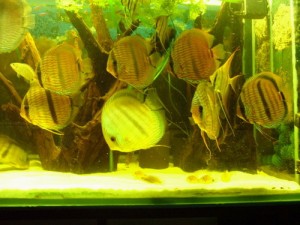 When I read “heckel” i read “life”…it’s the total interest taking me all my free time. Different language (I’m italian) inhibites me to be clear… However, I have at home about 18 heckels, in an aquarium, at least totally dedicated to their life and study. In other tanks I breed Green, alenquer (just one) and blu discus, and in another tank just fry from alenquerXsemi-royal, about 80 small discus. Ok, the focus is “heckel”. By myself I’ve turned back and separated them just becouse I’ve observed how the most important game in heckel’s life is played by pH, soft water, wood (peaty), peat, black water, low light, and feeding…a beat different (I assume totally) from other discus. I’ve seen spawning them several times, but space and time don’t allow me to follow the fry, and it becomes impossible to grow up fry in a tank with 16 other discus…but it isn’t impossible.
When I read “heckel” i read “life”…it’s the total interest taking me all my free time. Different language (I’m italian) inhibites me to be clear… However, I have at home about 18 heckels, in an aquarium, at least totally dedicated to their life and study. In other tanks I breed Green, alenquer (just one) and blu discus, and in another tank just fry from alenquerXsemi-royal, about 80 small discus. Ok, the focus is “heckel”. By myself I’ve turned back and separated them just becouse I’ve observed how the most important game in heckel’s life is played by pH, soft water, wood (peaty), peat, black water, low light, and feeding…a beat different (I assume totally) from other discus. I’ve seen spawning them several times, but space and time don’t allow me to follow the fry, and it becomes impossible to grow up fry in a tank with 16 other discus…but it isn’t impossible. 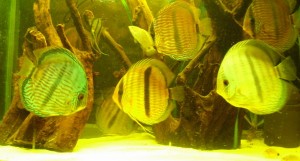 Somewhere, here in simplydiscus I’ve posted in the past some spawning picture of a heckel while fecunding eggs..don’t know where. Unsuccesfull!!! I didn’t like for 1st alenquerXheckel, and 2nd pH too low was becoming fatal for alenquer….so I broke the pair.
Somewhere, here in simplydiscus I’ve posted in the past some spawning picture of a heckel while fecunding eggs..don’t know where. Unsuccesfull!!! I didn’t like for 1st alenquerXheckel, and 2nd pH too low was becoming fatal for alenquer….so I broke the pair. 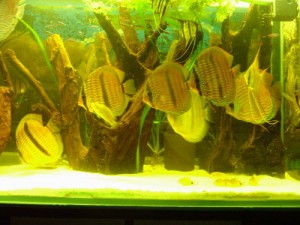 From the low of my experience I say that heckels aren’t easy, but I find more difficult other fishes, requiring continous treatment against lots of deseases, while heckel is able to raise his life with a good quality of water and a low pH.
From the low of my experience I say that heckels aren’t easy, but I find more difficult other fishes, requiring continous treatment against lots of deseases, while heckel is able to raise his life with a good quality of water and a low pH. 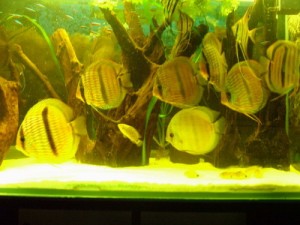 Several times I had for free heckel waiting for death from my favourite importer, and now I’m sure they are the best I have, how? Respecting a beat what goes on in nature. Never less than 10 heckels in a tank, never temperature over 28°C, never pH over 5,6, never fresh water not-prefiltered on peat, never lots of changes in the tank, never chemical additions, only peat, few light, floating plants, and peace around tank. I treat them really in a total different way, they can’t live with other discus, and other tetras not always resist in a low pH, so any choice you make only the time and experience may suggest you if it is ok or not. Water has to be black, they are scared from light (in wild the full moon too is an enemy for them), and the season make different water parameters and foods. So I change, and for several months I don’t change so much water, I don’t care of No3, PO4, but I care for foods, that during this period has to be poor, may be some spiruline flake, some frozen krill, some dry food, and few times during the day (they have to need and look for food). If water level goes down…that’s better, I just care to watch the filter pump, has not to remain dry, and nothing else. Afterward fresh r/o water, changes, lower temperature, 12 hours of light and proteinic live food (shrimps and grindal (aenchitreus albidus)), and you see fishes clening something, fighting, showing best colours and so on. Heckel, as Larry said (Larry, it’s a pleasure to read your posts, I’m a fan of you), isn’t coloured, and who has heckels may understand that they show the best coluours in 2 cases: for spawning, and if there’s an alpha individual. In other cases, they remain “prune”, even defending their piece of aquarium: in wild it’s the best way to to camouflage themselves from predators.
Several times I had for free heckel waiting for death from my favourite importer, and now I’m sure they are the best I have, how? Respecting a beat what goes on in nature. Never less than 10 heckels in a tank, never temperature over 28°C, never pH over 5,6, never fresh water not-prefiltered on peat, never lots of changes in the tank, never chemical additions, only peat, few light, floating plants, and peace around tank. I treat them really in a total different way, they can’t live with other discus, and other tetras not always resist in a low pH, so any choice you make only the time and experience may suggest you if it is ok or not. Water has to be black, they are scared from light (in wild the full moon too is an enemy for them), and the season make different water parameters and foods. So I change, and for several months I don’t change so much water, I don’t care of No3, PO4, but I care for foods, that during this period has to be poor, may be some spiruline flake, some frozen krill, some dry food, and few times during the day (they have to need and look for food). If water level goes down…that’s better, I just care to watch the filter pump, has not to remain dry, and nothing else. Afterward fresh r/o water, changes, lower temperature, 12 hours of light and proteinic live food (shrimps and grindal (aenchitreus albidus)), and you see fishes clening something, fighting, showing best colours and so on. Heckel, as Larry said (Larry, it’s a pleasure to read your posts, I’m a fan of you), isn’t coloured, and who has heckels may understand that they show the best coluours in 2 cases: for spawning, and if there’s an alpha individual. In other cases, they remain “prune”, even defending their piece of aquarium: in wild it’s the best way to to camouflage themselves from predators. 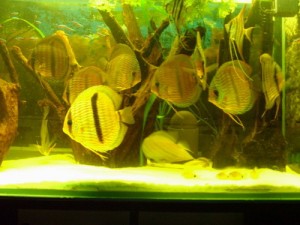 Another and last observation (that Larry did): they could be ready to spawn after 2,5 years old, not before. that’s why I suggest always to take small individuals, not adults. It’s more difficult to convince an adult that his life will finish in our tanks, better to start with small baby heckels, and satisfactions in long time will arrive. I’ve spoken about parameters…and feeding heckels. Let speak about heckel wild habitat: for 6 months they do not have particular foods to find, they just take what they find on ground, like some kind of algae, (not usually but)sometime a sort of shrimps with a slim scheleton (esoscheletro in italian)poor of chitin, and detritus, this last for more than 50% of their diet. Water is low, in low water period, temperature (during all the year however) different from day to night, from ground to surface (top), and…after 6 months rainy season: What does it change? Everything! Fruits, insects larvae, water parameters (nobody may assume if pH becomes lower or lightly higher)different, softer, diluited by rain, lots of foods and so on… Here’s the miracle: some hormonal recall bring them to spawn, and usually succesfull spawns are 3 or 4 at least, no more. Let analyse what does it changes, and difference between wild habitat and our tanks. We use to feed them all the time with proteinic foods, all the year, always same water level, same pH, same temperature, nothing changes, nothing for a hormonal recall to spawn! When I speak about a low pH, this last parameter is useful (or necessary) for wilds (and S. discus especially)to defend themselves from external attacks, to re-create the protective mucus fast, for bacteria (poor however in acid water) and fungus, but I’m sure (anyway not scientifically), that parameter changes are the fondamental ingredient to let them feel like in wild, different water level higher and lower), differend foods during seasons, and weather too…during winter it’s easier to assist to a spawinig. Heckel is the ancestral discus, is the one that isn’t easy to hold just because their adaptability needs lot of time, and breeding even more low. And even more low if we start with adults subjects.
Another and last observation (that Larry did): they could be ready to spawn after 2,5 years old, not before. that’s why I suggest always to take small individuals, not adults. It’s more difficult to convince an adult that his life will finish in our tanks, better to start with small baby heckels, and satisfactions in long time will arrive. I’ve spoken about parameters…and feeding heckels. Let speak about heckel wild habitat: for 6 months they do not have particular foods to find, they just take what they find on ground, like some kind of algae, (not usually but)sometime a sort of shrimps with a slim scheleton (esoscheletro in italian)poor of chitin, and detritus, this last for more than 50% of their diet. Water is low, in low water period, temperature (during all the year however) different from day to night, from ground to surface (top), and…after 6 months rainy season: What does it change? Everything! Fruits, insects larvae, water parameters (nobody may assume if pH becomes lower or lightly higher)different, softer, diluited by rain, lots of foods and so on… Here’s the miracle: some hormonal recall bring them to spawn, and usually succesfull spawns are 3 or 4 at least, no more. Let analyse what does it changes, and difference between wild habitat and our tanks. We use to feed them all the time with proteinic foods, all the year, always same water level, same pH, same temperature, nothing changes, nothing for a hormonal recall to spawn! When I speak about a low pH, this last parameter is useful (or necessary) for wilds (and S. discus especially)to defend themselves from external attacks, to re-create the protective mucus fast, for bacteria (poor however in acid water) and fungus, but I’m sure (anyway not scientifically), that parameter changes are the fondamental ingredient to let them feel like in wild, different water level higher and lower), differend foods during seasons, and weather too…during winter it’s easier to assist to a spawinig. Heckel is the ancestral discus, is the one that isn’t easy to hold just because their adaptability needs lot of time, and breeding even more low. And even more low if we start with adults subjects.

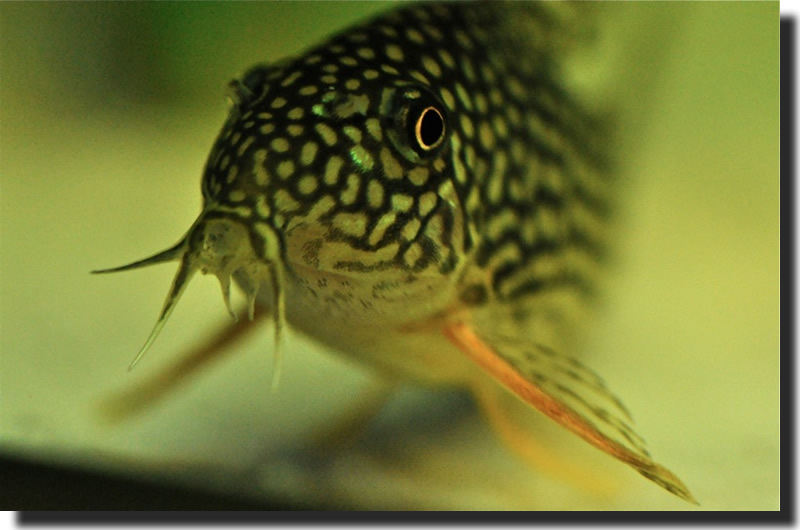

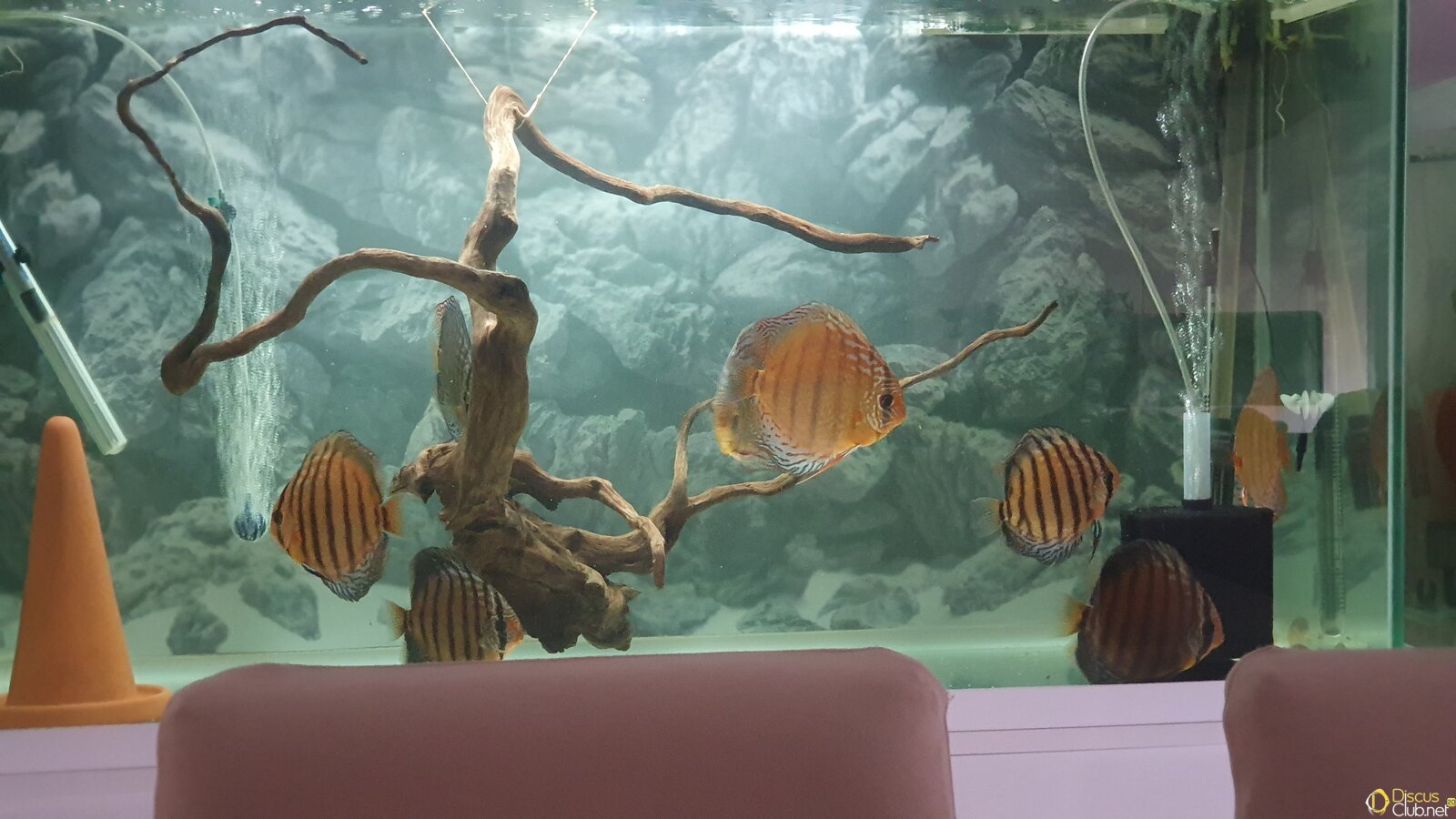
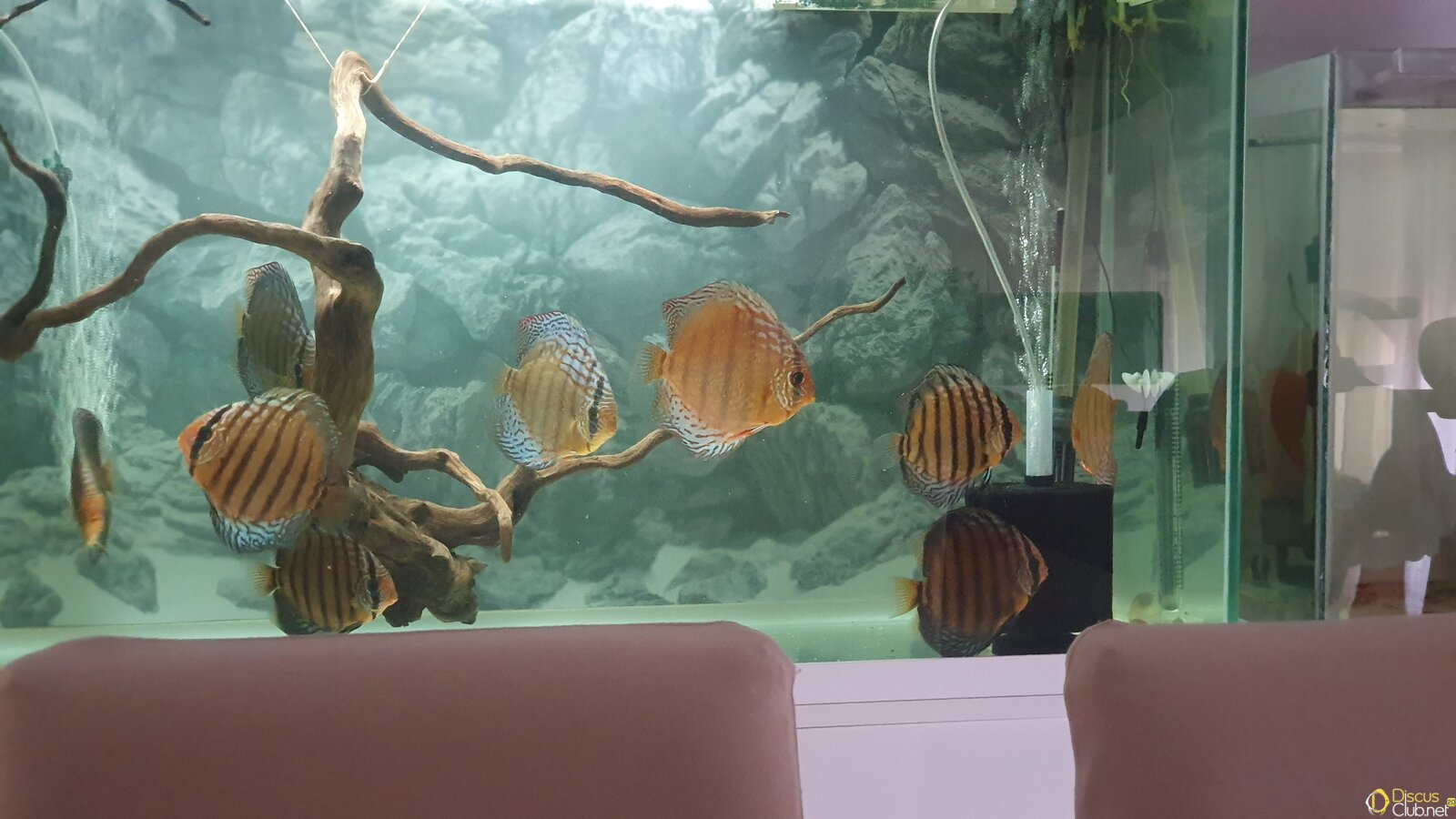
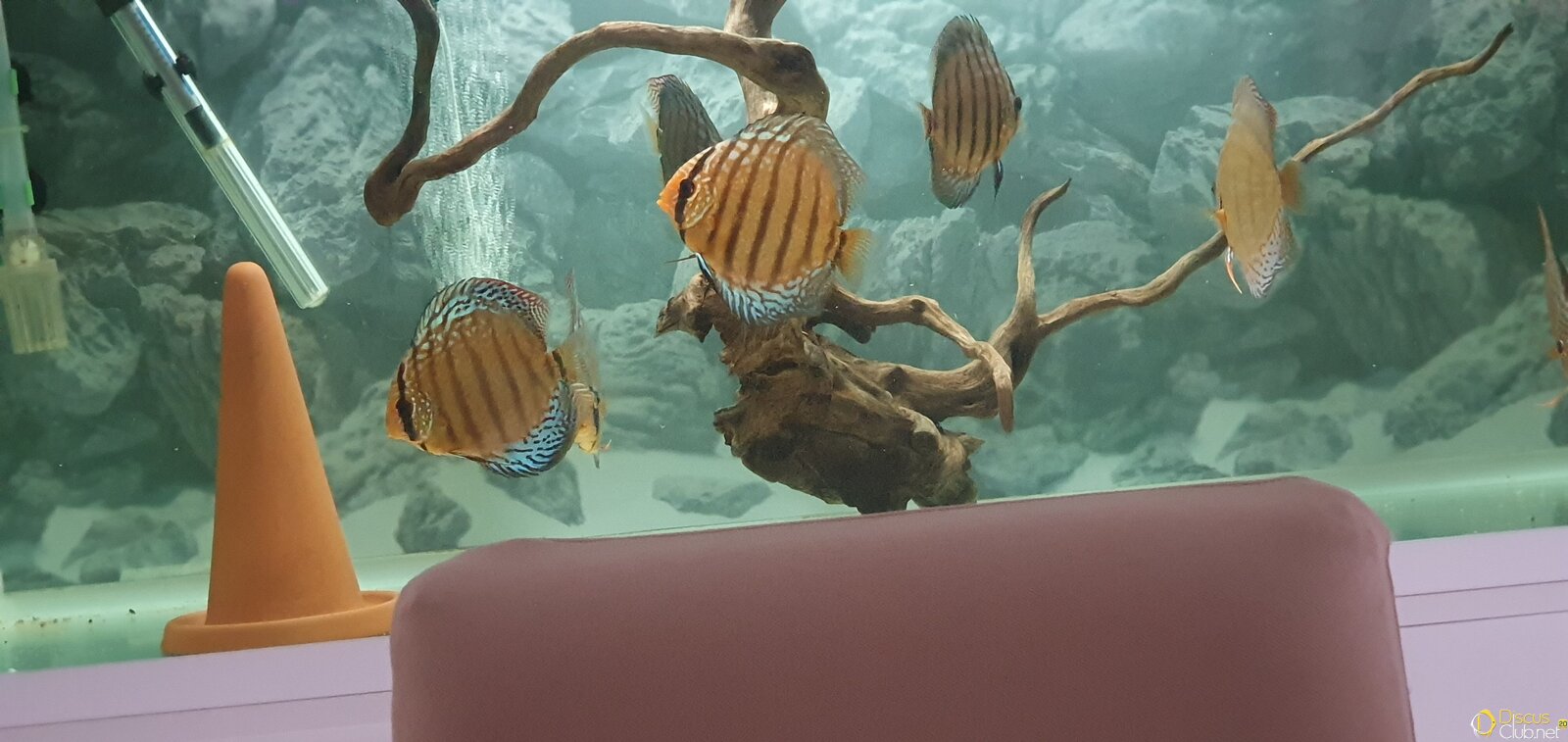
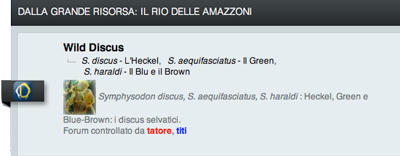
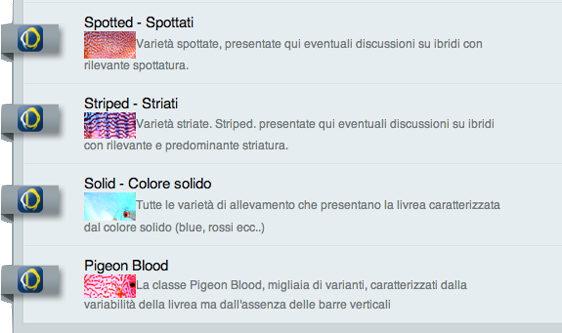
Devi effettuare l'accesso per postare un commento.